- Home
- Michael Bond
A Bear Called Paddington
A Bear Called Paddington Read online
CONTENTS
Cover
Title Page
Introduction by Michael Bond
Chapter One
Please Look After This Bear
Chapter Two
A Bear in Hot Water
Chapter Three
Paddington Goes Underground
Chapter Four
A Shopping Expedition
Chapter Five
Paddington and the ‘Old Master’
Chapter Six
A Visit to the Theatre
Chapter Seven
Adventure at the Seaside
Chapter Eight
A Disappearing Trick
By the Same Author
Copyright
About the Publisher
Introduction
Life is full of ups and downs, and one evening when I was doing some last-minute shopping in London’s Oxford Street and it began to snow so heavily I had to seek shelter in the nearest big store that was still open, it struck me as a good example of the latter: a definite downer, in fact.
It was Christmas Eve 1956 and I needed a ‘stocking filler’ for my wife. By then I was getting rather desperate for ideas, and as I wandered disconsolately through an unusually deserted toy department, I caught sight of a small bear sitting all by itself on a glass shelf.
Had it been a doll I wouldn’t have given it a second glance. Not that I have anything whatsoever against dolls, but as the famous actor and expert on these matters, the late Peter Bull, once said rather dismissively: “Dolls are always wondering what they are going to wear next, whereas you feel your secrets are safe with a bear and you never know what they are thinking.’
He was quite right, of course. Bears are a thing apart from all other cuddly toys. Although, from the expression on its face, I think I had a very good idea what was uppermost in its mind at that particular moment.
He looked so lonely and forlorn, the thought of him being alone all through Christmas seemed out of the question, so acting on an impulse I bought him without any further ado.
I little knew what lay ahead.
The next day, looking very much at home, he took up residence on the mantelpiece of our one-room flat near the Portobello Road, and because I had always wanted to use the name Paddington in a story, that’s what we called him, after our nearest main line railway station.
Names are important. Sometimes it is all a person has in their life, and I had been tempted to use it in a series of stories I wrote for the radio about an accident-prone uncle who was always getting into trouble. But a little voice inside me whispered “No”.
Writers should always obey ‘little voices’. They are invariably right and you disobey them at your peril. As things turned out I was doubly glad to have heeded the warning on this occasion, for it suited the bear down to the ground. It was important without being too grand, and it had a safe ring to it. Dignified, and reliable, it was the kind of name that would withstand the passage of time. Politeness would have been his middle name were it not for the fact that it was already encapsulated in the original.
We found ourselves talking to him. Bears have that kind of effect on people. You can’t ignore them. And in no time at all he became an alter ego.
One spring morning the following year, I found myself sitting at my typewriter with a blank sheet of paper at the ready, fingers itching to go, only to realise with a sinking heart that I didn’t have an idea in my head. Not so much a ‘writer’s block’ as a vast empty space with nothing, absolutely nothing in view.
In desperation I gazed around the room and as my glance fastened on the mantelpiece I found myself wondering what would happen if a real bear ended up on Paddington station; lost and friendless, with nowhere else to go. In order to get my brain working I typed the words: Mr and Mrs Brown first met Paddington on a railway platform. In fact, that was how he came to have such an unusual name for a bear, for Paddington was the name of the station.
And that was as far as I meant to go. After all, it was only a doodle to get my mind working. I had no intention of writing a chapter, let alone a book, and a children’s one at that. I didn’t even know any children at that time in my life, although I count that as a plus because they hate being written down to and it is something I have always tried to avoid.
On the other hand … something in the words caught my fancy.
Who were Mr and Mrs Brown? How had they suddenly popped into the picture? And what were they doing on Paddington station? As for Paddington himself, where was he lurking? Somewhere safe from the crowd probably; a dark corner near the Lost Property Office? Half wanting somebody to come to his rescue, the other half hoping nobody would find him.
To say that my fingers were racing to and fro over the keyboard would be a misnomer, because I’m self-taught. But by the evening I had what turned out to be the first chapter of a book on my hands.
Ten days later A Bear Called Paddington contained the answers to all the aforementioned questions.
Luckily I wouldn’t change a word of it. Paddington has his own unique outlook on the world and, as he says, “Things happen to me. I’m that sort of bear.”
Some years and several books later, I received a letter from a small boy to the effect that he was now so used to Paddington being the name of a bear it seemed a funny name for a station.
I know just what he meant!
Michael Bond
2013
Chapter One
Please Look After This Bear
MR AND MRS Brown first met Paddington on a railway platform. In fact, that was how he came to have such an unusual name for a bear, for Paddington was the name of the station.
The Browns were there to meet their daughter Judy, who was coming home from school for the holidays. It was a warm summer day and the station was crowded with people on their way to the seaside. Trains were humming, loudspeakers blaring, porters rushing about shouting at one another, and altogether there was so much noise that Mr Brown, who saw him first, had to tell his wife several times before she understood.
“A bear? On Paddington station?” Mrs Brown looked at her husband in amazement. “Don’t be silly, Henry. There can’t be!”
Mr Brown adjusted his glasses. “But there is,” he insisted. “I distinctly saw it. Over there – near the bicycle rack. It was wearing a funny kind of hat.”
Without waiting for a reply he caught hold of his wife’s arm and pushed her through the crowd, round a trolley laden with chocolate and cups of tea, past a bookstall, and through a gap in a pile of suitcases towards the Lost Property Office.
“There you are,” he announced triumphantly, pointing towards a dark corner, “I told you so!”
Mrs Brown followed the direction of his arm and dimly made out a small, furry object in the shadows. It seemed to be sitting on some kind of suitcase and around its neck there was a label with some writing on it. The suitcase was old and battered and on the side, in large letters, were the words WANTED ON VOYAGE.
Mrs Brown clutched at her husband. “Why, Henry,” she exclaimed. “I believe you were right after all. It is a bear!”
She peered at it more closely. It seemed a very unusual kind of bear. It was brown in colour, a rather dirty brown, and it was wearing a most odd-looking hat, with a wide brim, just as Mr Brown had said. From beneath the brim two large, round eyes stared back at her.
Seeing that something was expected of it the bear stood up and politely raised its hat, revealing two black ears. “Good afternoon,” it said, in a small, clear voice.
“Er… good afternoon,” replied Mr Brown, doubtfully. There was a moment of silence.
The bear looked at them inquiringly. “Can I help you?”
Mr Brown
looked rather embarrassed. “Well… no. Er… as a matter of fact, we were wondering if we could help you.”
Mrs Brown bent down. “You’re a very small bear,” she said.
The bear puffed out its chest. “I’m a very rare sort of bear,” he replied importantly. “There aren’t many of us left where I come from.”
“And where is that?” asked Mrs Brown.
The bear looked round carefully before replying. “Darkest Peru. I’m not really supposed to be here at all. I’m a stowaway!”
“A stowaway?” Mr Brown lowered his voice and looked anxiously over his shoulder. He almost expected to see a policeman standing behind him with a notebook and pencil, taking everything down.
“Yes,” said the bear. “I emigrated, you know.” A sad expression came into its eyes. “I used to live with my Aunt Lucy in Peru, but she had to go into a home for retired bears.”
“You don’t mean to say you’ve come all the way from South America by yourself?” exclaimed Mrs Brown.
The bear nodded. “Aunt Lucy always said she wanted me to emigrate when I was old enough. That’s why she taught me to speak English.”
“But whatever did you do for food?” asked Mr Brown. “You must be starving.”
Bending down, the bear unlocked the suitcase with a small key, which it also had round its neck, and brought out an almost empty glass jar. “I ate marmalade,” he said, rather proudly. “Bears like marmalade. And I lived in a lifeboat.”
“But what are you going to do now?” said Mr Brown. “You can’t just sit on Paddington station waiting for something to happen.”
“Oh, I shall be all right… I expect.” The bear bent down to do up its case again. As he did so Mrs Brown caught a glimpse of the writing on the label. It said, simply, PLEASE LOOK AFTER THIS BEAR. THANK YOU.
She turned appealingly to her husband. “Oh, Henry, what shall we do? We can’t just leave him here. There’s no knowing what might happen to him. London’s such a big place when you’ve nowhere to go. Can’t he come and stay with us for a few days?”
Mr Brown hesitated. “But Mary, dear, we can’t take him… not just like that. After all…”
“After all, what?” Mrs Brown’s voice had a firm note to it. She looked down at the bear. “He is rather sweet. And he’d be such company for Jonathan and Judy. Even if it’s only for a little while. They’d never forgive us if they knew you’d left him here.”
“It all seems highly irregular,” said Mr Brown, doubtfully. “I’m sure there’s a law about it.” He bent down. “Would you like to come and stay with us?” he asked. “That is,” he added, hastily, not wishing to offend the bear, “if you’ve nothing else planned.”
The bear jumped and his hat nearly fell off with excitement. “Oooh, yes, please. I should like that very much. I’ve nowhere to go and everyone seems in such a hurry.”
“Well, that’s settled then,” said Mrs Brown, before her husband could change his mind. “And you can have marmalade for breakfast every morning, and – ” she tried hard to think of something else that bears might like.
“Every morning?” The bear looked as if it could hardly believe its ears. “I only had it on special occasions at home. Marmalade’s very expensive in Darkest Peru.”
“Then you shall have it every morning starting tomorrow,” continued Mrs Brown. “And honey on Sunday.”
A worried expression came over the bear’s face. “Will it cost very much?” he asked. “You see, I haven’t very much money.”
“Of course not. We wouldn’t dream of charging you anything. We shall expect you to be one of the family, shan’t we, Henry?” Mrs Brown looked at her husband for support.
“Of course,” said Mr Brown. “By the way,” he added, “if you are coming home with us you’d better know our names. This is Mrs Brown and I’m Mr Brown.”
The bear raised its hat politely – twice. “I haven’t really got a name,” he said. “Only a Peruvian one which no one can understand.”
“Then we’d better give you an English one,” said Mrs Brown. “It’ll make things much easier.” She looked round the station for inspiration. “It ought to be something special,” she said thoughtfully. As she spoke an engine standing in one of the platforms gave a loud wail and a train began to move. “I know what!” she exclaimed. “We found you on Paddington station so we’ll call you Paddington!”
“Paddington!” The bear repeated it several times to make sure. “It seems a very long name.”
“Quite distinguished,” said Mr Brown. “Yes, I like Paddington as a name. Paddington it shall be.”
Mrs Brown stood up. “Good. Now, Paddington, I have to meet our little daughter, Judy, off the train. She’s coming home from school. I’m sure you must be thirsty after your long journey, so you go along to the buffet with Mr Brown and he’ll buy you a nice cup of tea.”
Paddington licked his lips. “I’m very thirsty,” he said. “Sea water makes you thirsty.” He picked up his suitcase, pulled his hat down firmly over his head, and waved a paw politely in the direction of the buffet. “After you, Mr Brown.”
“Er… thank you, Paddington,” said Mr Brown.
“Now, Henry, look after him,” Mrs Brown called after them. “And for goodness’ sake, when you get a moment, take that label off his neck. It makes him look like a parcel. I’m sure he’ll get put in a luggage van or something if a porter sees him.”
The buffet was crowded when they entered but Mr Brown managed to find a table for two in a corner. By standing on a chair Paddington could just rest his paws comfortably on the glass top. He looked around with interest while Mr Brown went to fetch the tea. The sight of everyone eating reminded him of how hungry he felt. There was a half-eaten bun on the table but just as he reached out his paw a waitress came up and swept it into a pan.
“You don’t want that, dearie,” she said, giving him a friendly pat. “You don’t know where it’s been.”
Paddington felt so empty he didn’t really mind where it had been but he was much too polite to say anything.
“Well, Paddington,” said Mr Brown, as he placed two steaming cups of tea on the table and a plate piled high with cakes. “How’s that to be going on with?”
Paddington’s eyes glistened. “It’s very nice, thank you,” he exclaimed, eyeing the tea doubtfully. “But it’s rather hard drinking out of a cup. I usually get my head stuck, or else my hat falls in and makes it taste nasty.”
Mr Brown hesitated. “Then you’d better give your hat to me. I’ll pour the tea into a saucer for you. It’s not really done in the best circles, but I’m sure no one will mind just this once.”
Paddington removed his hat and laid it carefully on the table while Mr Brown poured out the tea. He looked hungrily at the cakes, in particular at a large cream-and-jam one which Mr Brown placed on a plate in front of him.
“There you are, Paddington,” he said. “I’m sorry they haven’t any marmalade ones, but they were the best I could get.”
“I’m glad I emigrated,” said Paddington, as he reached out a paw and pulled the plate nearer. “Do you think anyone would mind if I stood on the table to eat?”
Before Mr Brown could answer he had climbed up and placed his right paw firmly on the bun. It was a very large bun, the biggest and stickiest Mr Brown had been able to find, and in a matter of moments most of the inside found its way on to Paddington’s whiskers. People started to nudge each other and began staring in their direction. Mr Brown wished he had chosen a plain, ordinary bun, but he wasn’t very experienced in the ways of bears. He stirred his tea and looked out of the window, pretending he had tea with a bear on Paddington station every day of his life.
“Henry!” The sound of his wife’s voice brought him back to earth with a start. “Henry, whatever are you doing to that poor bear? Look at him! He’s covered all over with cream and jam.”
Mr Brown jumped up in confusion. “He seemed rather hungry,” he answered, lamely.
Mrs Brown turne
d to her daughter. “This is what happens when I leave your father alone for five minutes.”
Judy clapped her hands excitedly. “Oh, Daddy, is he really going to stay with us?”
“If he does,” said Mrs Brown, “I can see someone other than your father will have to look after him. Just look at the mess he’s in!”
Paddington, who all this time had been too interested in his bun to worry about what was going on, suddenly became aware that people were talking about him. He looked up to see that Mrs Brown had been joined by a little girl, with laughing blue eyes and long, fair hair. He jumped up, meaning to raise his hat, and in his haste slipped on a patch of strawberry jam which somehow or other had found its way on to the glass table-top. For a brief moment he had a dizzy impression of everything and everyone being upside down. He waved his paws wildly in the air and then, before anyone could catch him, he somersaulted backwards and landed with a splash in his saucer of tea. He jumped up even quicker than he had sat down, because the tea was still very hot, and promptly stepped into Mr Brown’s cup.
Judy threw back her head and laughed until the tears rolled down her face. “Oh, Mummy, isn’t he funny!” she cried.
Paddington, who didn’t think it at all funny, stood for a moment with one foot on the table and the other in Mr Brown’s tea. There were large patches of white cream all over his face, and on his left ear there was a lump of strawberry jam.
“You wouldn’t think,” said Mrs Brown, “that anyone could get in such a state with just one bun.”
Mr Brown coughed. He had just caught the stern eye of a waitress on the other side of the counter. “Perhaps,” he said, “we’d better go. I’ll see if I can find a taxi.” He picked up Judy’s belongings and hurried outside.
Paddington stepped gingerly off the table and, with a last look at the sticky remains of his bun, climbed down on to the floor.
Judy took one of his paws. “Come along, Paddington. We’ll take you home and you can have a nice hot bath. Then you can tell me all about South America. I’m sure you must have had lots of wonderful adventures.”

 Paddington on Top
Paddington on Top Paddington Takes the Test
Paddington Takes the Test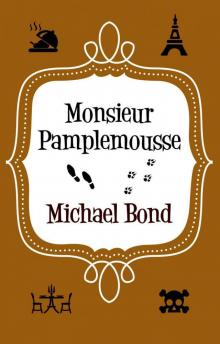 Monsieur Pamplemousse (Monsieur Pamplemousse Series)
Monsieur Pamplemousse (Monsieur Pamplemousse Series) Paddington Here and Now
Paddington Here and Now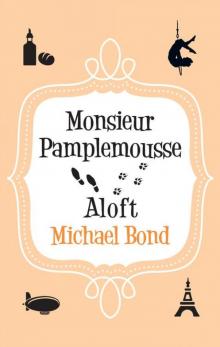 Monsieur Pamplemousse Aloft
Monsieur Pamplemousse Aloft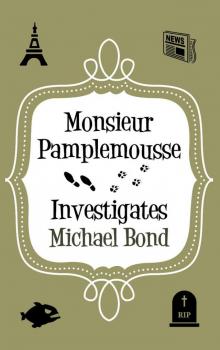 Monsieur Pamplemousse Investigates
Monsieur Pamplemousse Investigates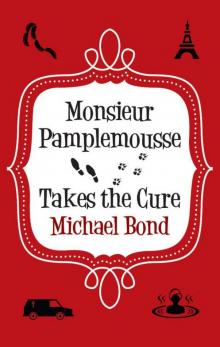 Monsieur Pamplemousse Takes the Cure
Monsieur Pamplemousse Takes the Cure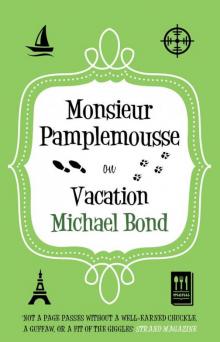 Monsieur Pamplemousse on Vacation
Monsieur Pamplemousse on Vacation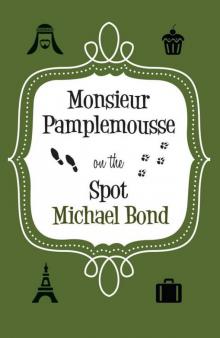 Monsieur Pamplemousse on the Spot
Monsieur Pamplemousse on the Spot Monsieur Pamplemousse Hits the Headlines
Monsieur Pamplemousse Hits the Headlines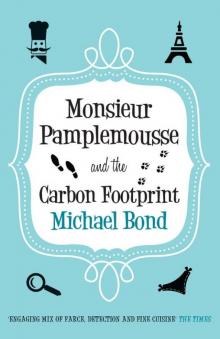 Monsieur Pamplemousse and the Carbon Footprint
Monsieur Pamplemousse and the Carbon Footprint Love from Paddington
Love from Paddington Paddington’s Finest Hour
Paddington’s Finest Hour Paddington Complete Novels
Paddington Complete Novels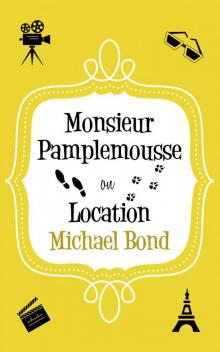 Monsieur Pamplemousse On Location
Monsieur Pamplemousse On Location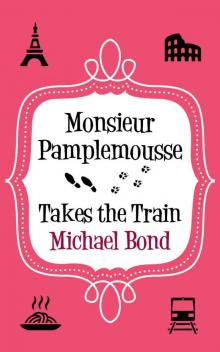 Monsieur Pamplemousse Takes the Train
Monsieur Pamplemousse Takes the Train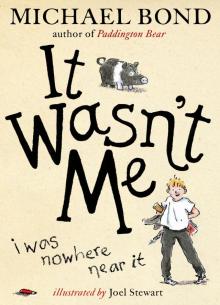 It Wasn’t Me!
It Wasn’t Me! Paddington Races Ahead
Paddington Races Ahead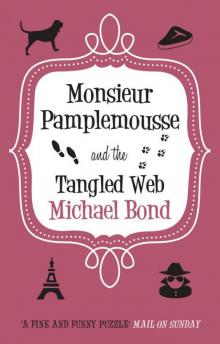 Monsieur Pamplemousse and the Tangled Web
Monsieur Pamplemousse and the Tangled Web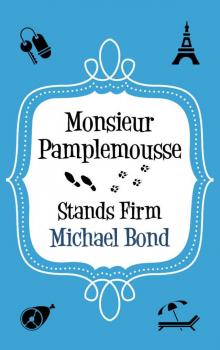 Monsieur Pamplemousse Stands Firm
Monsieur Pamplemousse Stands Firm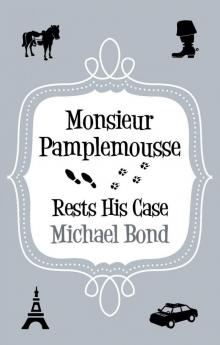 Monsieur Pamplemousse Rests His Case
Monsieur Pamplemousse Rests His Case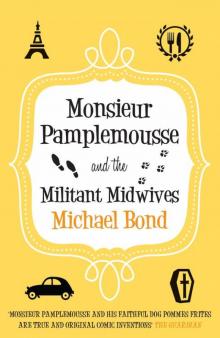 Monsieur Pamplemousse and the Militant Midwives
Monsieur Pamplemousse and the Militant Midwives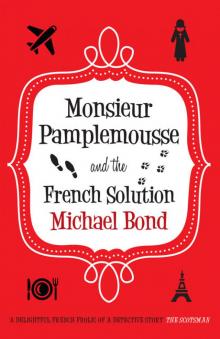 Monsieur Pamplemousse and the French Solution
Monsieur Pamplemousse and the French Solution Paddington Helps Out
Paddington Helps Out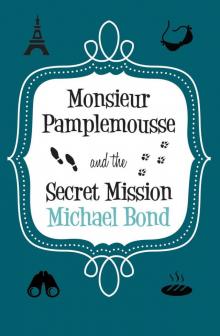 Monsieur Pamplemousse & the Secret Mission (Monsieur Pamplemousse Series)
Monsieur Pamplemousse & the Secret Mission (Monsieur Pamplemousse Series)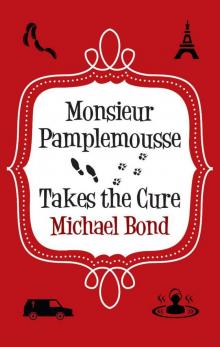 Monsieur Pamplemousse Takes the Cure (Monsieur Pamplemousse Series)
Monsieur Pamplemousse Takes the Cure (Monsieur Pamplemousse Series) A Bear Called Paddington
A Bear Called Paddington